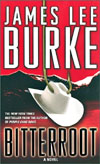
Comment
on this story
|
 |

James Lee Burke's mysteries juxtapose natural beauty with human violence
by Paul Lewis
Let me be up front about this, so people don't think the glowing words that follow equal a payola agenda of some sort. I'm a huge fan of James Lee Burke; I've read each of his 21 novels, recommended him wholeheartedly to friends and bookstore customers on two coasts, and I even met him on his most recent book tour. As far as pure writers go, and especially as far as they venture into the hard-boiled mystery genre, Burke is defin-itely The Man.
Take that all into consideration as I recommend his two most recent titles, Bitterroot (Pocket, $7.99) and Jolie Blon's Bounce (Simon & Schuster, $25.00). Bitterroot features his newest protagonist, the ex-Texas Ranger turned attorney Billy Bob Holland, while Jolie Blon's Bounce is the twelfth book showcasing Cajun cop Dave Robicheaux. Both are  Southern lawmen tortured by the mistakes of their pasts and the complexities of their present days, though their tragedies and resolutions are distinct and compelling. While Robicheaux's albatross is his propensity for violence and addiction, Holland is haunted, literally, by the ghost of his ex-partner, L.Q. Navarro, whom Billy Bob accidentally killed on a Mexican drug raid. Southern lawmen tortured by the mistakes of their pasts and the complexities of their present days, though their tragedies and resolutions are distinct and compelling. While Robicheaux's albatross is his propensity for violence and addiction, Holland is haunted, literally, by the ghost of his ex-partner, L.Q. Navarro, whom Billy Bob accidentally killed on a Mexican drug raid.
Bitterroot is the third Holland novel (the first, Cimmaron Rose, won the Edgar Award from the Mystery Writers of America in 1998), and, as one could discern from the title, it features Holland sojourning in Montana, visiting an old friend and his daughter. Soon, his illegitimate son, Lucas, and his associate and sometimes love interest, Temple Carroll, are visiting, as a stew of corporate interests, outlaw bikers, right-wing survivalists, and the darker aspects of the entertainment industry collude to make his visit an unpleasant one. Chief among his headaches is the ex-con rodeo clown Wyatt Dixon, a vile and violent man with a flair for the dramatic who blames Billy Bob for his own incarceration and his sister's death.
The spark of the plot is a public stink raised by Holland's friend, widower Tobin "Doc" Voss, ex-military-meltdown-turned-doctor-turned-poet who disagrees with corporate mining policies which use cyanide to extract gold. It's a nod to a detail from Burke's own Pulitzer-Prize-nominated The Lost Get-Back Boogie wherein a patriarchal character protests environmental practices of a Montana logging company, leading to family tragedy. Bitterroot is a socially conscious, page-turning achievement that deserves a place on not just mystery bookshelves.
Jolie Blon's Bounce takes its name from the classic Cajun tune "Jolie Blon." In the novel, the song is updated with a modern rhythm and blues twist by Tee Bobby Hulin, a young, strung-out Louisiana musician charged with the murders of an adolescent white girl and, to muddy the procedural waters, a prostitute with family ties to the mob. Overshadowing the investigation is one of Burke's most chilling, villainous creations yet, the former plantation foreman Legion Guidry, whose own past inhuman actions set the stage for Robicheaux's current predicaments. The sins of the fathers visit the present as racial inequality and the meaner aspects of human nature conspire to bury crimes, old and new alike. Burke has smartly allowed the plot to dredge up Robicheaux's predisposition to addiction, one of the most compelling character points in the series and a testament to his protagonist's ability to overcome.
Returning are all the supporting characters Robicheaux fans have come to count on: Robicheaux's wife Bootsie, his daughter Alafair, his dock and bait-shop manager Batiste, his sheriff's office partner Helen Soileau, and most importantly and delightfully, Clete Purcel, Dave's old partner from his days on the New Orleans homicide beat. Clete is an unleashing of the id into the world, the man who gleefully does the things Dave can't or won't do, and a beautifully Falstaffian character all in his own right. Clete Purcel is one of the greatest sidekick characters ever scripted, bar none.
Burke's strongest suit is placing scenes of intense violence next to stunning evocations of the landscape of the natural world. He's often called the modern William Faulkner, and his evocative style certainly earns the favorable comparisons, but his terse, effective dialogue rings with the clarity of Ernest Hemingway. Burke is one of the few genre stylists who can honestly claim literary pedigree and who manages to brew intricate plotting and pure descriptive writing in a powerfully palatable roux that tingles a reader's senses each and every outing. His Montana and especially his New Iberia, Louisiana, are so vivid you can nearly smell them, and I always equate the ability of a writer to engage the senses in his work to be the mark of a craftsman.
Burke has become so successful with Robicheaux and Holland that he has the luxury to break from the detective cycle for his next book, a Civil War novel titled White Doves at Morning, continuing a fascination with that conflict that recurs throughout his work. Next summer is the thirteenth Robicheaux novel. If you start reading now, you might just have time to catch up.

July 11, 2002 * Vol. 12, No. 28
© 2002 Metro Pulse
|